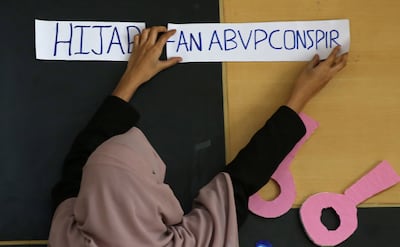Indian Prime Minister Narendra Modi said on Tuesday the country cannot run on “two laws”, as he made a strong pitch for legislation slated to replace religious customs in a range of areas.
India, a diverse and multi-faith nation of 1.4 billion people, allows its religious communities to follow their scriptures and traditions for marriage, divorce, property and adoption.
But Mr Modi's right-wing Hindu nationalist Bharatiya Janata Party has been trying to introduce the contentious Uniform Civil Code which, if passed, will apply to all religious groups.
Several communities have expressed concern that the new bill will be used to discriminate against minority religious groups.
"How is it possible for one member in a house to have one law and the other member to have another law? Will that house be able to run? How will a country run on these dual systems? We have to remember that the Constitution gives equal rights,” Mr Modi said.
The BJP has for decades campaigned for the UCC, saying that the prevailing laws are discriminatory and promote inequality.
The party has used the prospect of passing the law as an election promise in previous decades as part of its hardline Hindu ideology, and is pushing to revive the flashpoint issue ahead of the national elections next year.
Many right-wing Hindus have been championing the cause and accuse Muslims of using Islamic laws to facilitate polygamy and gender discrimination.

The Muslim community, which makes up around 20 per cent of India's population, currently uses its own religious laws to administer marriages, divorces and property.
Other minority religious communities, such as Christians, whose laws are based on Biblical scriptures, have also opposed the law, as have tribal communities in remote northeastern regions, where more than 200 tribes have their own varied customary laws.
Earlier this month, the Law Commission of India solicited views, ideas and suggestions on the UCC from the public and recognised religious organisations.
Mr Modi said that political parties that oppose the UCC are hungry for a “vote bank” and accused them of exploiting, ignoring and denying Muslims their rights.
He further spoke about triple talaq, the instant divorce in Islam that was deemed unconstitutional in 2017 – a major principle of his government – to emphasise the importance of introducing a common code.
“Those who speak in favour of triple talaq are hungry for vote banks. They are doing a huge injustice to Muslim daughters and sisters", he said, adding that the practice had been abolished in other Islamic countries. "If it was related to Islam, then no Islamic nation would have abolished it.”
“I was in Egypt, 90 per cent of the population are Sunni Muslims and it abolished the practice some 90 years ago. If it is an essential organ, then why is it not practiced in Pakistan, Indonesia, Qatar, Jordan, Syria, Bangladesh?”
“We are seeing that work is being done to instigate such people in the name of Uniform Civil Code,” he said.
Several opposition leaders lashed out at the Prime Minister, accusing him of distracting people from “real issues” in the country, such as the months-long ethnic violence in Manipur, where more than 100 people have been killed since May.
“He should first answer about poverty, price rise and unemployment in the country. He never speaks on the Manipur issue; the whole state is burning for the last 60 days. He is just distracting people from all these issues,” KC Venugopal of the Indian National Congress said.

